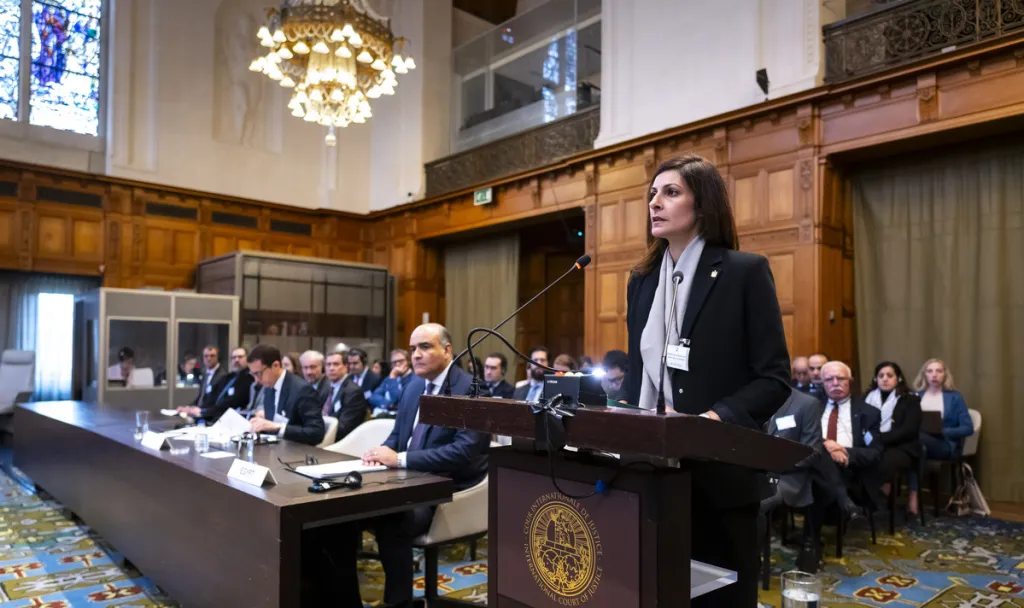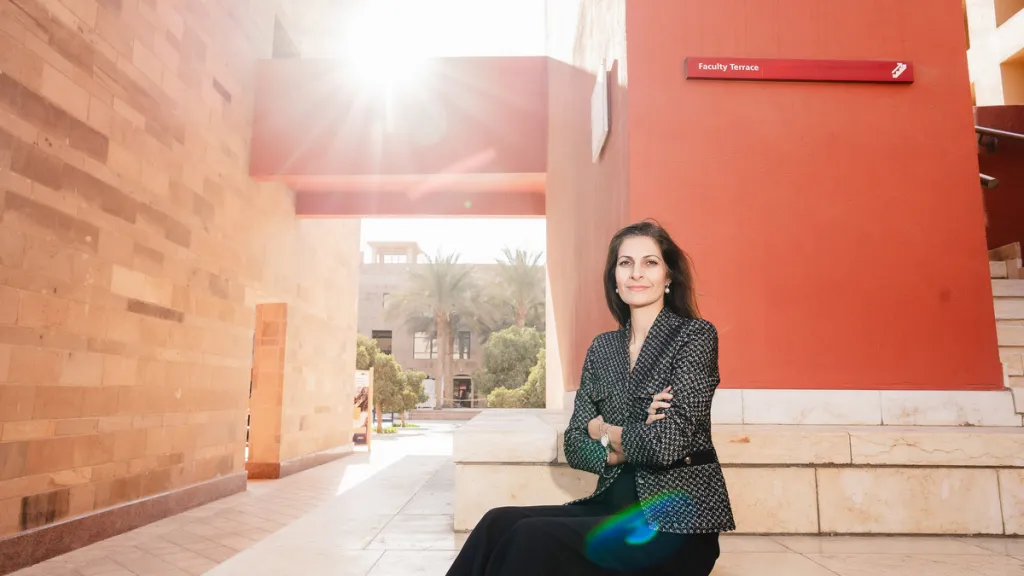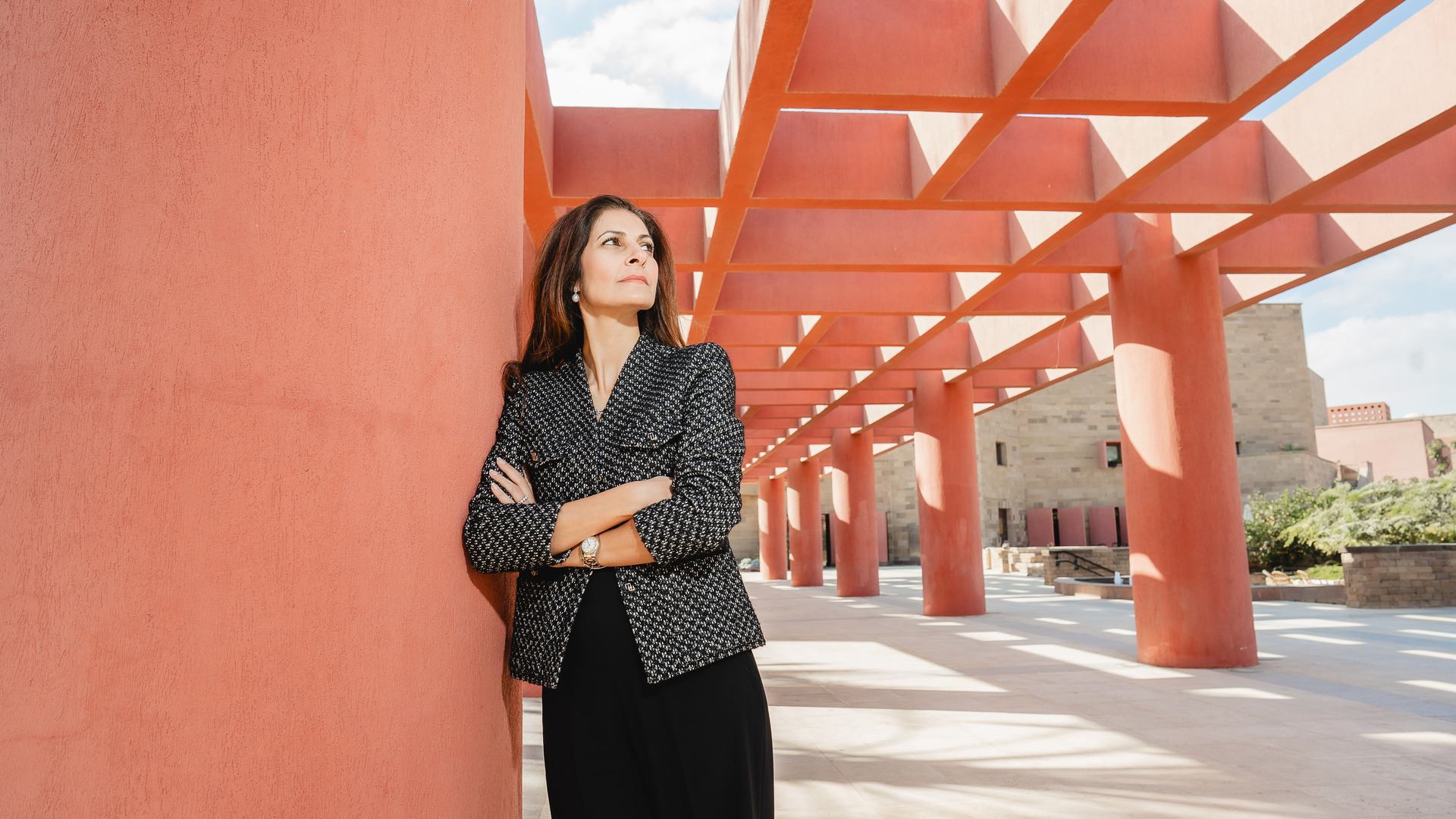By Celeste Abourjeili
"I remember walking into that court in the morning feeling overwhelmed, and it almost seemed like the peak of my career aspirations. I'm in the court representing Egypt in a case addressing the situation in Palestine," says Jasmine Moussa '02, '05.
Moussa is a legal adviser in Egypt's Ministry of Foreign Affairs, and she recently presented Egypt's oral arguments at the International Court of Justice (ICJ) in the advisory opinion on the legality of the Israeli occupation of Palestine.
At the court, Moussa highlighted the 75-year history of Palestinian suffering at the hands of Israel. "History will judge us for how we respond today," said Moussa in her ICJ address. She ultimately declared, on behalf of Egypt, that "Israel's prolonged occupation is therefore illegal and is an ongoing, internationally wrongful act that must be immediately brought to an end."
The aftermath was possibly even more disorienting. "We don't typically do media appearances, but on the plane back, passengers, flight staff and the pilot recognized me." she says. Moussa had mixed feelings about the attention at first, but overall felt honored for the reception, and relieved that people generally respected the work she had done. "People in this ministry put a lot of trust in me with that task, and I just felt so privileged and thankful that it was well received. It felt like a nice, big celebration that we had all collectively done something," she says.

Bold Beginnings
Moussa discovered her interest in international law and politics at AUC, where she double majored in political science and economics. "I was at AUC between 1998 and 2002, which was a turbulent time for the region," she says, explaining that the era witnessed conflicts in Palestine, Southern Lebanon and Iraq, as well as 9/11. "The campus was really alive with political discussions and debates, and there was a lot of student activism around those themes. AUC was a place where we had complete freedom of thought, complete freedom of action."
She found that student engagement was always welcome from her professors. "Once, we organized a massive drive to collect donations for Palestine, and it was so huge that we blocked the roads for a week. We had 33 trucks full of humanitarian relief supplies," shares Moussa. She and her fellow students inspired others in her community to help too, with underprivileged children bringing bags of rice and sugar for the cause.
Moussa was also engaged in the Cairo International Model United Nations on campus, which kept her aware of current developments. She took part in the model of the International Court of Justice, even presiding over it at moments. "It all started at AUC: my passion for the Palestinian cause, justice, international law and the international rule of law. These interests drove me throughout my career."
When Moussa finished her undergraduate degree, she decided to become an international lawyer, completing her first postgraduate degree in international human rights law at AUC.
Building a Career
Moussa's first job after AUC was an internship with the Arab League. It was there that she wrote a short memo about requesting an advisory opinion on the legality of settlements in occupied Palestine. "To me, that was very obvious. Why don't we go to the ICJ and ask for an advisory opinion? And then, 20 odd years later, it happened," she says.
Later, in 2005, Moussa joined Egypt's Ministry of Foreign Affairs, but she didn't just want to work in diplomacy -- she wanted to specialize in the field of law and chart the path forward. This drove her to pursue a law degree at Cairo University, a master's in law from the London School of Economics and Political Science and a PhD in law at Cambridge. "Every step in my path was further confirmation that I was in the right field, doing the right thing," she affirms.
"There's a whole new generation of Egyptian international lawyers who are amplifying Egypt's voice in the international legal arena."
Though the law is not always applied correctly, Moussa feels she is contributing to improving its application in this part of the world, particularly in Egypt. "International law is a tool for developing countries to try to get their rights asserted at the global level," she says. "There's a whole new generation of Egyptian international lawyers who are amplifying Egypt's voice in the international legal arena."
While exciting and fast-paced, the job is anything but easy. Moussa and her team work six days a week with open-ended working hours. "We live in the office, and it comes at an expense," she says. "Oftentimes, our goal is not to reach an agreement, but rather to avoid one that does not serve Egypt's best interest."
Outside the office, Moussa's time is dedicated to her family. She has two young children and a husband. While she used to love writing poetry and volunteering, her time now is limited to work and family. "It's very difficult for women to maintain a career in law," she reflects. "There are a lot of women who enter the field, but then they're not able to continue in it for very long."
Making the Case
The work of an international lawyer can be painstakingly slow, Moussa says. "Some agreements can take decades, even generations to negotiate. The apparent lack of results is one of the most frustrating parts of my work."
This is especially true when it comes to Palestine. "In the Palestinian case, it seems that very little is achievable. There doesn't seem to be much prospect for peace," she explains. Moussa finds the disregard for international law in the Palestinian case particularly frustrating and believes that the ICJ ruling has revealed a pattern of noncompliance with international law when it comes to Palestine.
"For decades we've talked about Israel's obligations as an occupying power until it occurred to the Palestinians to ask the question, 'Is this occupation lawful to begin with?'" Instead of ruling on how Israel should be conducting the occupation, lawyers like Moussa are now arguing that Israel should not be conducting the occupation in the first place because the whole situation is unlawful.
"The ICJ complied; it gave the opinion that Israel needs to end its unlawful presence in the Occupied Palestinian Territory with an overwhelming majority," she says. "With international law, we can keep critiquing the system, or we can try to use it to our favor to achieve incremental gains."
Moussa believes this is a reality that Palestinians have become acutely aware of today. "Now, Palestinians are trying to get decisions from international courts so that we're not just talking about rights in the abstract, but about rights confirmed by the highest judicial organ of the global system," Moussa explains. This pathway, Moussa says, has helped other countries vindicate their rights, such as Mauritius in its claim for sovereignty over Chagos, Namibia during its fight for independence and South Africans at the end of apartheid. "If you work from within the system, it will sometimes work in your favor," she says.
When asked about her advice to current AUCians, Moussa warns that many will try to dissuade them by arguing that the work students feel passionate about is too hard. The field of international law, for instance, is very competitive and has lots of experts without many opportunities. Yet, following her own advice, Moussa did what she was passionate about and never gave up. "Don't take no for an answer, and just keep at it. Because that's really what it is," she says. "You try and try and try."



